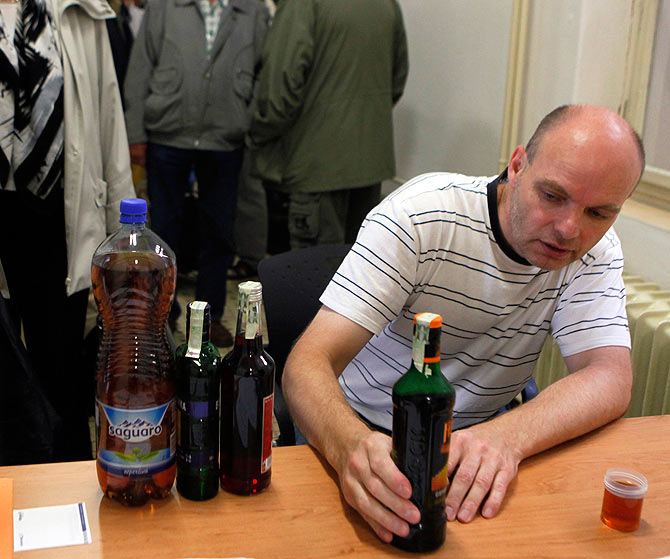Photographs: Mike Powell/AllSport
A round up of all the health news that matters to you.
We begin with simple exercises that can help you cut down on your stress level.
Doing aerobic exercise, breathing slowly and calling a pal could help you cut down on your stress, according to experts.
Jane Roy, PhD, associate professor of human studies in the University of Alabama at Birmingham School of Education and her human studies colleagues, Larrell Wilkinson, PhD, assistant professor, and Retta Evans, PhD, associate professor, put heads together to share stress-management tips:
- The experts have said that movement is a great, natural way to de-stress, asserting that it serves as a distractor from the stressor.
- Another way to reduce stress is to take about 10 to 15 minutes walk around the neighbourhood.
- Having fun is another way to de-stress.
Wilkinson said that searching for the positives in situations can also help cut down on tensions plaguing your mind.
Top foods to beat BP blues revealed
Food Technology magazine’s contributing editor Linda Milo Ohr has written about some foods that have a beneficial effect on lowering blood pressure.
Results from a study of 32 pre-hypertensive adult subjects showed that a patented grape seed extract may help to lower both systolic and diastolic blood pressure after just eight weeks (Polyphenolics, 2013a).
A study (Katz et al, 2012) showed that 56 g of walnuts a day cut systolic blood pressure and did not lead to weight gain.
Another study (West et all 2012), 28 subjects with high cholesterol showed reductions in systolic blood pressure after one serving of pistachios a day.
During a 12-week study, researchers gave 46 pre-hypertensive subjects raisins or other snacks equal in calorie value three times a day. At weeks four, eight and 12, subjects eating raisins showed a significantly reduced systolic blood pressure (Bays et al, 2012).
Drinking coffee cuts liver cancer risk
Photographs: Marcus Donner/Reuters
Drinking three cups of coffee daily can reduce the risk of developing liver cancer by more than 50 per cent, a new study has claimed.
Coffee consumption also reduces risk of hepatocellular carcinoma (HCC), the most common type of liver cancer, by about 40 per cent, according to an up-to-date meta-analysis published in Clinical Gastroenterology and Hepatology, a journal of the American Gastroenterological Association.
Liver cancer is the sixth most common cancer in the world, and the third most common cause of cancer death. HCC is the main type of liver cancer, accounting for more than 90 per cent of cases worldwide.
"Our research confirms past claims that coffee is good for your health, and particularly the liver," said study author Carlo La Vecchia.
"The favourable effect of coffee on liver cancer might be mediated by coffee's proven prevention of diabetes, a known risk factor for the disease, or for its beneficial effects on cirrhosis and liver enzymes," said Vecchia from the department of epidemiology, Istituto di Ricerche Farmacologiche Mario.
Negri, and department of clinical sciences and community health, Universita degli Studi di Milan, Italy.
Researchers performed a meta-analysis of articles published from 1996 through September 2012, ultimately studying 16 high-quality studies and a total of 3,153 cases.
Despite the consistency of results across studies, time periods and populations, it is difficult to establish whether the association between coffee drinking and HCC is causal, or if this relationship may be partially attributable to the fact that patients with liver and digestive diseases often voluntarily reduce their coffee intake, researchers said.
Listening to favourite music can help relieve nagging pain
Photographs: Scott Wintrow/Stringer
Researchers have claimed that listening to favourite music can help you manage pain.
A new survey by chemists at LloydsPharmacy has shown that listening to Bach can ease backache and the Eels’ ‘Novocaine For The Soul’ could help reduce pain, Metro.co.uk reported.
The poll found that four in ten people living with constant pain said that listening to their favourite tunes helps them relax and feel better.
The study suggested that the most effective genres are pop, classical and rock and indie music, while the songs that work best include Bridge Over Troubled Water by Simon and Garfunkel, Robbie Williams’ Angels, Albatross by Fleetwood Mac and The Commodores’ hit Easy.
The chemists surveyed 1,500 people and learned two thirds of patients aged 16 to 24 got the most help by listening to music to manage their aches and pains.
Single night of boozing amounts to quarter of weekly calorie intake
Photographs: Akintunde Akinleye/Reuters
A new survey has found that 26 per cent of slimmers consume a quarter of their weekly calorie intake in alcohol alone.
The poll of 1000 slimmers carried out by Forza Supplements has found that four out of ten consume 1,000 calories in alcohol on just one night out, News.com.au reported.
It was found that more than 50 per cent of the respondents said boozing made them hungrier, while four in five said it lowered their willpower, causing them to indulge in junk food.
The company’s Lee Smith said the key to successful dieting is cutting out alcohol.
He said studies showed that alcohol increases your appetite by suppressing leptin, the hormone which normally tells your brain to stop eating, but it also negatively effects many other brain chemicals that are involved in appetite suppression.
Smith asserted that the other really damaging thing is that as few as two standard alcoholic drinks can slow down your body’s fat-burning process by a whopping 73 per cent.
Daily dose of Vitamin D can help stave off diabetes
Photographs: David W Cerny/Reuters
A daily dose of vitamin D can be used in the battle against Type 2 diabetes, experts have revealed.
Researchers are carrying out a major clinical trial to confirm whether taking vitamin D can prevent or delay the condition, the Daily Express reported.
They believe that the “sunshine vitamin” may reduce diabetes risk by 25 per cent.
The study led by Professor Philip Raskin, from UT Southwestern Medical Center in Dallas, Texas, is a four-year trial across America which will track 2,500 people age 30 or older who have pre-diabetes.
They will be given daily doses of vitamin D about five times higher than usually recommended.
Binge drinking linked to increased stroke risk in middle-aged men
Photographs: Petr Josek Snr/Reuters
A new study has showed that excessive alcohol consumption increases the progression of atherosclerosis and the risk of stroke in middle-aged men.
The Finnish population-based research found that progression of atherosclerosis was increased among men who consumed 6 drinks or more on one occasion. In addition, the risk of stroke increased among men who had at least one hangover per year.
Hangovers increased the risk of stroke independent of the total amount of alcohol consumed. Hypertension and overweight, in the presence of alcohol consumption, further increased the risk of stroke. Drinking large quantities of alcohol more than twice a week increased the risk of stroke mortality in men.
The subjects were a population-based sample of more than 2,600 men living in eastern Finland and participating in the Kuopio Ischaemic Heart Disease Risk Factor Study (KIHD). The follow-up time was between 11 to 20 years.
Alcohol consumption was assessed using the Nordic alcohol consumption inventory. Incident strokes were ascertained through the FINMONICA stroke register, which is the Finnish part of the WHO MONICA (Multinational Monitoring of Trends and determinants in Cardiovascular Diseases), and from the Finnish national hospital discharge register and death certificate registers.
Excessive alcohol consumption has been associated with a wide range of medical conditions. Moderate alcohol consumption is linked to a lower risk of stroke than abstinence, whereas heavy alcohol consumption has been associated with an increased risk of stroke and stroke mortality.
Ms Sanna Rantakomi, MSc, presented the results in her doctoral thesis at the University of Eastern Finland.
Herbal and weight loss supplements, energy drinks deadly for liver
Photographs: Sean Gallup/Getty Images
Severe liver damage, and even failure, has been associated with weight loss supplements, herbal supplement and energy drinks, according to various case studies.
There have been many reports of toxicity associated with dietary supplement use over the years, some with severe and even fatal outcomes.
Lead investigator Dina Halegoua-De Marzio, MD, reported a rare case of fulminant liver failure associated with the ingestion of SlimQuick, a weight loss supplement containing green tea extract.
A 52-year old female patient was admitted to the emergency room after one week of vomiting and progressive jaundice. The patient reported she had ingested SlimQuick for two days, while fasting three weeks prior to intake.
According to Dr Halegoua-De Marzio, the patient’s physical examination showed normal mental status, icteric sclera, mild abdominal distension and lower extremity edema.
Her liver biopsy was consistent with confluent hepatic necrosis with collapse. The steroid prednisone was started but discontinued after two days, as liver function worsened and mental status deteriorated. After being evaluated and listed for liver transplant, the patient underwent transplantation two days later.
Dr Halegoua-De Marzio believes this is the first reported case of fulminant liver failure due to the consumption of SlimQuick. The main ingredient in SlimQuick is green tea extract, a common ingredient in several dietary supplements, some of which have been withdrawn from the market due to safety concerns.
Other case reports were about Black Cohosh-induced hepatotoxicity leading to early cirrhosis, acute liver failure following consumption of a popular sugar-free energy drink for a year and a case of drug-induced liver injury arising from ripped fuel.









Comment
article